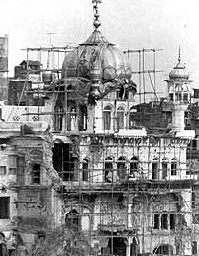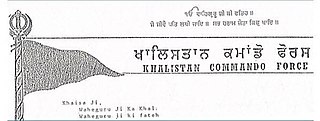
Operation Blue Star was a military operation by the Indian Armed Forces conducted between 1 and 10 June 1984 to remove Jarnail Singh Bhindranwale and other Sikh militants from the Golden Temple, a holy site of Sikhism, and its adjacent buildings.

The Indian Army is the land-based branch and largest component of the Indian Armed Forces. The President of India is the Supreme Commander of the Indian Army, and its professional head is the Chief of Army Staff (COAS). The Indian Army was established on 1 April 1895 alongside the long established presidency armies of the East India Company, which too were absorbed into it in 1903. Some princely states maintained their own armies which formed the Imperial Service Troops which, along with the Indian Army formed the land component of the Armed Forces of the Crown of India, responsible for the defence of the Indian Empire. The Imperial Service Troops were merged into the Indian Army after independence. The units and regiments of the Indian Army have diverse histories and have participated in several battles and campaigns around the world, earning many battle and theatre honours before and after Independence.

The Border Security Force (BSF) is a central armed police force in India under the Ministry of Home Affairs. It is responsible for guarding India’s borders with Pakistan and Bangladesh. It was formed in the wake of the Indo-Pakistani War of 1965 to ensure the security of India’s borders and for related matters. All officers and subordinate staff are trained at the BSF Academy in Tekanpur near Gwalior in Madhya Pradesh.

The National Security Guard (NSG), commonly known as Black Cats, is a counter-terrorism unit of India under the Ministry of Home Affairs. It was founded on 16 October 1984, following Operation Blue Star, to combat terrorist activities and protect states against internal disturbances. The unit's formation was formalised in the Parliament of India under the National Security Guard Act, 1986. NSG personnel are recruited from both the Indian Army and Central Armed Police Forces. The NSG is not classified as a traditional paramilitary force, but instead as a "specialised federal contingency unit".

Babbar Khalsa also known as Babbar Khalsa International, is a Sikh militant organisation that aims to create an independent nation-state of Khalistan in the Punjab region of South Asia. It has used armed attacks, assassinations and bombings in aid of that goal, and is deemed to be a terrorist entity by various governments. Besides India, it operates in North America and Europe, including Scandinavia.

The Khalistan Commando Force (KCF) is a Sikh Khalistani militant organisation operating in the state of Punjab, India with prominent members based in Canada, United Kingdom and Pakistan. Its objective is the creation of a Sikh independent state of Khalistan through armed struggle. KCF is also responsible for many assassinations in India, including the 1995 assassination of Punjab Chief Minister Beant Singh. It is designated as a Terrorist Organisation by the Government of India.

The Insurgency in Punjab was an armed campaign by the separatists of the Khalistan movement from the mid-1980s to the mid-1990s. Economic and social pressures driven by the Green Revolution prompted calls for Sikh autonomy and separatism. This movement was initially peaceful, but foreign involvement and political pressures drove a heavy handed response from Indian authorities. The demand for a separate Sikh state gained momentum after the Indian Army's Operation Blue Star in 1984 aimed to flush out militants residing in the Golden Temple in Amritsar, a holy site for Sikhs. Terrorism, police brutality and corruption of the authorities greatly exacerbated a tense situation. By the mid-1980s, the movement had evolved into a militant secessionist crisis due to the perceived indifference of the Indian state in regards to mutual negotiations. Eventually, more effective police and military operations, combined with a policy of rapprochement by the Indian government and the election loss of separatist sympathizers in the 1992 Punjab Legislative Assembly election, largely quelled the rebellion by the mid-1990s.

The Khalistan Liberation Force (KLF) is a Khalistani militant organisation operating in the Punjab with prominent members based in Canada, United Kingdom and Pakistan. Its objective is the creation of a sovereign Sikh nation‐state of Khalistan through armed struggle. It is responsible for numerous assassinations, abductions, and military engagements with the Indian Armed Forces during the Insurgency in Punjab. The KLF is also listed as a designated terrorist group by India.
The Bhindranwale Tiger Force of Khalistan (BTFK) is a Sikh militant organization and was one of several major separatist organizations in the Khalistan movement during the insurgency in Punjab, India. The BTFK's main aim was to establish a Sikh homeland called Khalistan. At its peak, the BTFK's membership totaled 500 members and remained the strongest pro-Khalistan group in Tarn Taran Sahib, which was the epicenter of violence during the Punjab insurgency.

The Dashmesh Regiment is a militant group, and is part of the Khalistan movement to create a Sikh homeland called Khalistan via armed struggle.

Sukhdev Singh Dhillon, also known as General Labh Singh and Sukha Sipahi was an Indian militant, police officer, and Sikh separatist who took command of the Khalistan Commando Force after its first leader, Manbir Singh Chaheru, was arrested in 1986.
From 1984 to 1995, the state of Punjab in northern India was engaged in a power struggle between the militant secessionist Khalistan movement and Indian security forces. The Indian government responded to the escalating Punjab insurgency by launching Operation Blue Star in 1984, storming the Harmandir Sahib, or Golden Temple complex in Amritsar—the center of Sikh religious and spiritual life, where some militant groups had retreated. The Operation was controversial and resulted in death of hundreds of civilians, militants and soldiers. After Sikh bodyguards assassinated Prime Minister Indira Gandhi, a state wide massacre ensued.

The 2010 Kashmir unrest was a series of violent protests and riots in the Kashmir Division and Chenab Valley and Pir Panjal regions of Northern Jammu division of Jammu and Kashmir, India which started in June 2010 after the Indian Army claimed to have killed three Pakistani infiltrators in which a soldier of the Territorial Army, a counter-insurgent and a former special police officer had found three young men from their Nadihal village in Baramulla district and killed them in a "staged" encounter at Sona Pindi. The protests occurred in a movement launched by Hurriyat Conference led by Syed Ali Shah Geelani and Mirwaiz Umar Farooq in the Indian state of Jammu and Kashmir in June 2010, who called for the complete demilitarisation of Jammu and Kashmir. The All Parties Hurriyat Conference made this call to a strike, citing human rights abuses by security forces. Rioters shouting pro-independence slogans, defied curfew, attacked riot police with stones and burnt vehicles and buildings. The protests started out as anti India protests but later were also targeted against the United States following the 2010 Qur'an-burning controversy. The riot police consisting of Jammu and Kashmir Police and Indian Para-military forces fired teargas shells rubber bullets and also live ammunition on the protesters, resulting in 112 deaths, including many teenagers and an 11-year-old boy. The protests subsided after the Indian government announced a package of measures aimed at defusing the tensions in September 2010.

Gurjant Singh Budhsinghwala was a Sikh militant and the third Jathedar of the Khalistan Liberation Force. Budhsinghwala's organization, KLF, was one of the most active and main Sikh militant groups during the insurgency in Punjab, India. Budhsinghwala had KLF join the Sohan Singh Panthic Committee and partnered with Khalistan Commando Force (Panjwar), Babbar Khalsa, Bhindranwale Tiger Force (Sangha), and Sikh Student Federation (Bittu) in militant actions.

The 2013 India–Pakistan border incidents was a series of armed skirmishes along the Line of Control (LoC) in the disputed Kashmir area. Starting from the mid-January 2013, they have been described as the "worst bout of fighting in the region in nearly 10 years". It began on 6 January 2013, when according to Pakistani reports Indian forces attacked a Pakistani border post, killing one soldier. Indian authorities claimed the incident as a retaliation against preceding Pakistani ceasefire violations, but denied having crossed the demarcation line. In a second skirmish on 8 January, Indian authorities said that Pakistani forces crossed the LoC, killing two Indian soldiers. The incident sparked outrage in India and harsh reactions by the Indian army and government over the news that the body of one of the soldiers had been beheaded. Pakistan denied these reports. On 15 January, a third skirmish reportedly led to the death of another Pakistani soldier.
On 27 July 2015, three gunmen dressed in army uniforms opened fire on a bus and then attacked the Dina Nagar police station in Gurdaspur district of Punjab, India. The attack resulted in the death of three civilians and four policemen, including a superintendent of police; fifteen others were injured. In addition, five bombs were found planted on the Amritsar–Pathankot line on a rail-bridge near Parmanand railway station, five kilometers from the site of the attack. All three attackers were killed in the operation, which lasted almost 12 hours.
Operation Radd-ul-Fasaad was a combined military operation by the Pakistani military in support of local law enforcement agencies to disarm and eliminate the terrorist sleeper cells across all states of Pakistan, started on 22 February 2017. The operation aimed to eliminate the threat of terrorism, and consolidating the gains of Operation Zarb-e-Azb which was launched in 2014 as a joint military offensive. It was further aimed at ensuring the security of Pakistan's borders. The operation underwent active participation from the Pakistan Army, Pakistan Air Force, Pakistan Navy, Pakistan Police and other Warfare and Civil Armed Forces managed under the Government of Pakistan. More than 375,000 intelligence-based operations had been carried out as of 2021. This operation has been mostly acknowledged after Operation Zarb e Azb.
Events in the year 2023 in India, during which it became the world's most populous country.

Khalistan Tiger Force (KTF) is a militant outfit of the Khalistan movement. In February 2023, it was designated as a terrorist organization by the Government of India.













